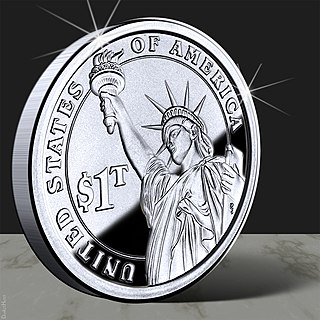Related Research Articles
In economics, a recession is a business cycle contraction that occurs when there is a period of broad decline in economic activity. Recessions generally occur when there is a widespread drop in spending. This may be triggered by various events, such as a financial crisis, an external trade shock, an adverse supply shock, the bursting of an economic bubble, or a large-scale anthropogenic or natural disaster. There is no official definition of a recession, according to the IMF.

The Economist is a weekly newspaper published in printed magazine format and digitally. It focuses on current affairs, international business, politics, technology, and culture, and is mostly written and edited in Britain. Based in London, the newspaper is owned by the Economist Group, with its core editorial offices in the United States, as well as across major cities in continental Europe, Asia, and the Middle East. The newspaper has a prominent focus on data journalism and interpretive analysis over original reporting, to both criticism and acclaim.

Paul Robin Krugman is an American economist who is the Distinguished Professor of Economics at the Graduate Center of the City University of New York and a columnist for The New York Times. In 2008, Krugman was the sole winner of the Nobel Memorial Prize in Economic Sciences for his contributions to new trade theory and new economic geography. The Prize Committee cited Krugman's work explaining the patterns of international trade and the geographic distribution of economic activity, by examining the effects of economies of scale and of consumer preferences for diverse goods and services.

Slate is an online magazine that covers current affairs, politics, and culture in the United States. It was created in 1996 by former New Republic editor Michael Kinsley, initially under the ownership of Microsoft as part of MSN. In 2004, it was purchased by The Washington Post Company, and since 2008 has been managed by The Slate Group, an online publishing entity created by Graham Holdings. Slate is based in New York City, with an additional office in Washington, D.C.

In economic policy, austerity is a set of political-economic policies that aim to reduce government budget deficits through spending cuts, tax increases, or a combination of both. There are three primary types of austerity measures: higher taxes to fund spending, raising taxes while cutting spending, and lower taxes and lower government spending. Austerity measures are often used by governments that find it difficult to borrow or meet their existing obligations to pay back loans. The measures are meant to reduce the budget deficit by bringing government revenues closer to expenditures. Proponents of these measures state that this reduces the amount of borrowing required and may also demonstrate a government's fiscal discipline to creditors and credit rating agencies and make borrowing easier and cheaper as a result.

Nouriel Roubini is a Turkish-born Iranian-American economic consultant, economist, speaker and writer. He is a Professor Emeritus since 2021 at the Stern School of Business of New York University.
The Tax Foundation is an international research think tank based in Washington, D.C. that collects data and publishes research studies on U.S. tax policies at both the federal and state levels. Its stated mission is to "improve lives through tax policy research and education that leads to greater economic growth and opportunity".
Donald Luskin is Chief Investment Officer for Trend Macrolytics LLC, a consulting firm he founded in 2001, providing investment strategy and macroeconomics forecasting and research for institutional investors. Luskin contributes commentaries on the editorial page of the Wall Street Journal, and appears regularly on Fox Business. He was formerly a CNBC contributor, a contributing editor and columnist for National Review Online (NRO), and a columnist for TheStreet.com. His media commentaries and appearances touch on investing, economic and political matters.
In finance, statistical arbitrage is a class of short-term financial trading strategies that employ mean reversion models involving broadly diversified portfolios of securities held for short periods of time. These strategies are supported by substantial mathematical, computational, and trading platforms.
Contrarian investing is an investment strategy that is characterized by purchasing and selling in contrast to the prevailing sentiment of the time.

James Kenneth Glassman served as Under Secretary of State for Public Diplomacy and Public Affairs from 2008 to 2009. From 2009 to 2013, he was the founding executive director of the George W. Bush Institute, a public policy development institution focused on creating independent, nonpartisan solutions to America's most pressing public policy problems through the principles that guided President George W. Bush and his wife Laura in public life. The George W. Bush Institute is based within the George W. Bush Presidential Center on the campus of Southern Methodist University in Dallas.
Equity risk is "the financial risk involved in holding equity in a particular investment." Equity risk is a type of market risk that applies to investing in shares. The market price of stocks fluctuates all the time, depending on supply and demand. The risk of losing money due to a reduction in the market price of shares is known as equity risk.

Donald Joseph Boudreaux is a libertarian American economist, author, professor, and co-director of the Program on the American Economy and Globalization at the Mercatus Center at George Mason University in Fairfax, Virginia.
A real-estate bubble or property bubble is a type of economic bubble that occurs periodically in local or global real estate markets, and it typically follows a land boom. A land boom is a rapid increase in the market price of real property such as housing until they reach unsustainable levels and then declines. This period, during the run-up to the crash, is also known as froth. The questions of whether real estate bubbles can be identified and prevented, and whether they have broader macroeconomic significance, are answered differently by schools of economic thought, as detailed below.
SCOTUSblog is a law blog written by lawyers, law professors, and law students about the Supreme Court of the United States. Formerly sponsored by Bloomberg Law, the site tracks cases before the Court from the certiorari stage through the merits stage. The site live blogs as the Court announces opinions and grants cases, and sometimes has information on the Court's actions published before either the Court or any other news source does. SCOTUSblog frequently hosts symposiums with leading experts on the cases before the Court. The blog comprehensively covers all of the cases argued before the Court and maintains an archive of the briefing and other documents in each case.

Russell David "Russ" Roberts is an American-born Israeli economist. He is currently a research fellow at Stanford University's Hoover Institution and president of Shalem College in Jerusalem. He is known for communicating economic ideas in understandable terms as host of the EconTalk podcast.

The Great Recession was a period of market decline in economies around the world that occurred from late 2007 to mid-2009. The scale and timing of the recession varied from country to country. At the time, the International Monetary Fund (IMF) concluded that it was the most severe economic and financial meltdown since the Great Depression.
John Howland Cochrane is an American economist who has served as the Rose-Marie and Jack Anderson Senior Fellow at the Hoover Institution since 2015. A specialist in financial economics and macroeconomics, he has been a professor of finance and economics by courtesy at the Stanford Graduate School of Business since 2016. From 1994 to 2015, he served as the AQR Capital Management Distinguished Service Professor of Finance at the University of Chicago Booth School of Business.

The trillion-dollar coin is a concept that emerged during the United States debt-ceiling crisis of 2011 as a proposed way to bypass any necessity for the United States Congress to raise the country's borrowing limit, through the minting of very high-value platinum coins. The concept gained more mainstream attention by late 2012 during the debates over the United States fiscal cliff negotiations and renewed debt-ceiling discussions. After reaching the headlines during the week of January 7, 2013, use of the trillion-dollar coin concept was ultimately rejected by the Federal Reserve and the Treasury.
Nathan E. "Ned" Davis, is an American financial analyst, finance author, and co-founder of the Ned Davis Research Group (NDRG), a data-driven investment research company based in Venice, Florida.
References
- ↑ Vardy, Nicholas (15 June 2007). "Magazine Covers: The #1 Contrarian Indicator?". Seeking Alpha . Retrieved 22 July 2024.
- ↑ Lahart, Justin (29 March 2005). "Cover up". The Wall Street Journal.
- ↑ Krugman, Paul (21 August 2017). "The magazine cover effect". krugman.blogs.nytimes.com (Blog post). Retrieved 22 July 2024.
- ↑ Ritholtz, Barry L. (2 July 2008). "The Housing Abyss". ritholtz.com.
- ↑ Coggan, Philip (26 October 2016). "Are magazine covers a contrarian indicator?". economist.com (Blog post). Retrieved 13 November 2016.
- ↑ Coggan, Philip (24 September 2016). "The low-rate world". economist.com (Blog post). Retrieved 13 November 2016.